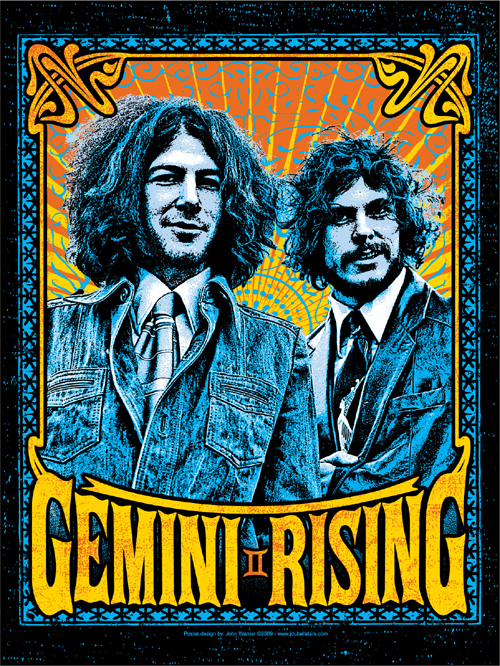LFM’s Steve Greaves reviews the award-winning web series satire about the fictional, 70’s progressive rock band, “Gemini Rising.”
By Steve Greaves. Before there were hair bands, there were hairy bands. Yes, the heather was high and across the mythic plains there were hairy, sensitive barbarians in hordes of typically five, but growing in might at times to numbers almost unimaginable. Few live to bear witness. Quite often the drummer would don an afro though he be of the Celtic dynasty.
There are niches within niches, and Koldcast.com’s web TV series Gemini Rising picks up the musk of a very specific kind of band at a very specific juncture in popular (or not) music culture. For a while in the early 70’s, after the Summer of Love sounds had burned out and UK and NY punk were not yet kicking, there was a lot of soul-searching and cosmic exploration informing the kinds of themes and approaches to being a “rock” band. Much of what emerged at that time was amorphous, exploratory, meandering, melodramatic and self-indulgent schlock. It is to rock what “fusion” is to jazz – i.e., technically impressive, but virtually hook-free and generally leaves you in a worse mood than before.
The term coined was Progressive Rock, and while there are many, many great songs and bands in the genre when it began through today, one has to laugh at the inherent ridiculousness of the original trappings: grown men in tights and scarves singing operatically and emoting in a quasi-Shakespearian manner about wizards and astrology. It was one big hairy Renaissance Pleasure Faire and an aural gateway to the ages for those willing to explore the far edge of listenability.

Allrighty then Shackleton, let’s talk bands. Experience the nerdy wrath of names like Uriah Heep, Marillion, Pendragon, Hawkwind, Elf and Rainbow (Ronnie James Dio is a movement unto himself too vast to explore here, all you need to know is he’s slain many a hydraulic dragon in as many middle-earthly bands, and is a powerful elvine singer who also fronted Black Sabbath post-Ozzy Ozbourne).
The common thing about bands amid this subterranean niche in “hardish” rock is not so much what they are but that what they’re not: not hard enough to be metal. Not catchy enough to be pop. Not light enough to be jazz. Too noisy to be opera. These are broad strokes to draw admittedly, but this is the kaleidoscopic point of entry into fully grasping the modest genius of Gemini Rising.
While there is a surprising amount of variety among episodes in the series, what holds it all together is the lack of anything much ever really happening. Like their own music and that of their “contemporaries” cited previously, the act never really lands because the band itself is never grounded and always in juvenile crisis. As a caricature, Gemini Rising is the spawn of other “rock mockumentary” bands that are perpetually stuck in a rut even when opportunities to show off their cosmosonic magic arise … anywhere from within recording studios, to the Gong Show-styled Larry LaMay variety hour – and all guaranteed to bring a yellow and orange glow to your 14-inch Zenith.
Comparisons to This is Spinal Tap and Bad News are a given anytime a hard “rock mock” shows up, but the idea is again fresh and the large, funny and clearly dedicated cast and varied settings put an original and enthusiastic spin on the typical flailing band situations. The genius is in being so confidently loose within a sub-genre that can only be recreated through the pains of extreme specificity. The look and feel of the people, the places and the music videos and media within the environment are spot on. Lead singer Robert Mckenzie is perfectly cast in east coast actor and Syrrah vocalist Righteous Jolly, who sounds not unlike the formidable Geoff Tate of neo-prog metal icon, Queensryche.
 The sheer dumpiness of the era and the fringes of the midwest and rustbelt provide plenty of deadpan juxtapositions, as well as a textural approach to the film that flatters its efforts – nay, its quest to be vintage ’74 in flavor. Fake hairs on the projector, low lighting, and other distressed effects add to the smutty visual character of the series. Clever use of graphics and exacting font choices complete the whole wood-paneled non-spectacle. You’ll be craving a Tab and a stick of Big Red in no time.
The sheer dumpiness of the era and the fringes of the midwest and rustbelt provide plenty of deadpan juxtapositions, as well as a textural approach to the film that flatters its efforts – nay, its quest to be vintage ’74 in flavor. Fake hairs on the projector, low lighting, and other distressed effects add to the smutty visual character of the series. Clever use of graphics and exacting font choices complete the whole wood-paneled non-spectacle. You’ll be craving a Tab and a stick of Big Red in no time.
Shot on a shoestring or merely made to look that way, the expansive cast and at times spacious outdoor locations (“We’re going to bring birds into the studio?” “That goose is an artist!”) go a long way to make this production feel bigger than it is. Part of the charm of this effort is that the “young underdog band” is mirrored to an extent by the obvious “let’s put on a show” ethic of everyone involved, a sort of lo-fi equilibrium between the filmmakers and the subject matter that allows for enough discipline to stage something inventive and funny without taking itself too seriously in the process. Overthinking this material would suck the spontaneous life right out of it. All in all this is a great example of the kind of fun, affordable, collaborative art filmmakers can actually create and get seen today with little more than talent and imagination.
Highlights include the extra episode “Amphibian Liberation Army” (the star of whom is an activist who goes by the handle “Che Johnson”) and song performances including “Lady of the Lake” and “Star Child.” A good place to start your zodiacal rock odyssey is the Gemini Rising trailer above.
Interesting review Steve. I didn’t really follow the whole “progressive rock” scene in the ’70s (I was more into the whole Studio 54/Liza Minelli/Halston glamor-disco vibe) but your review really took me back to that era. The photos are funny too … the facial hair on those guys is something else …
BTW I really liked your “Yuki 7” post – hope that comes out soon as a movie! Very cool animation and music. That was a great era.